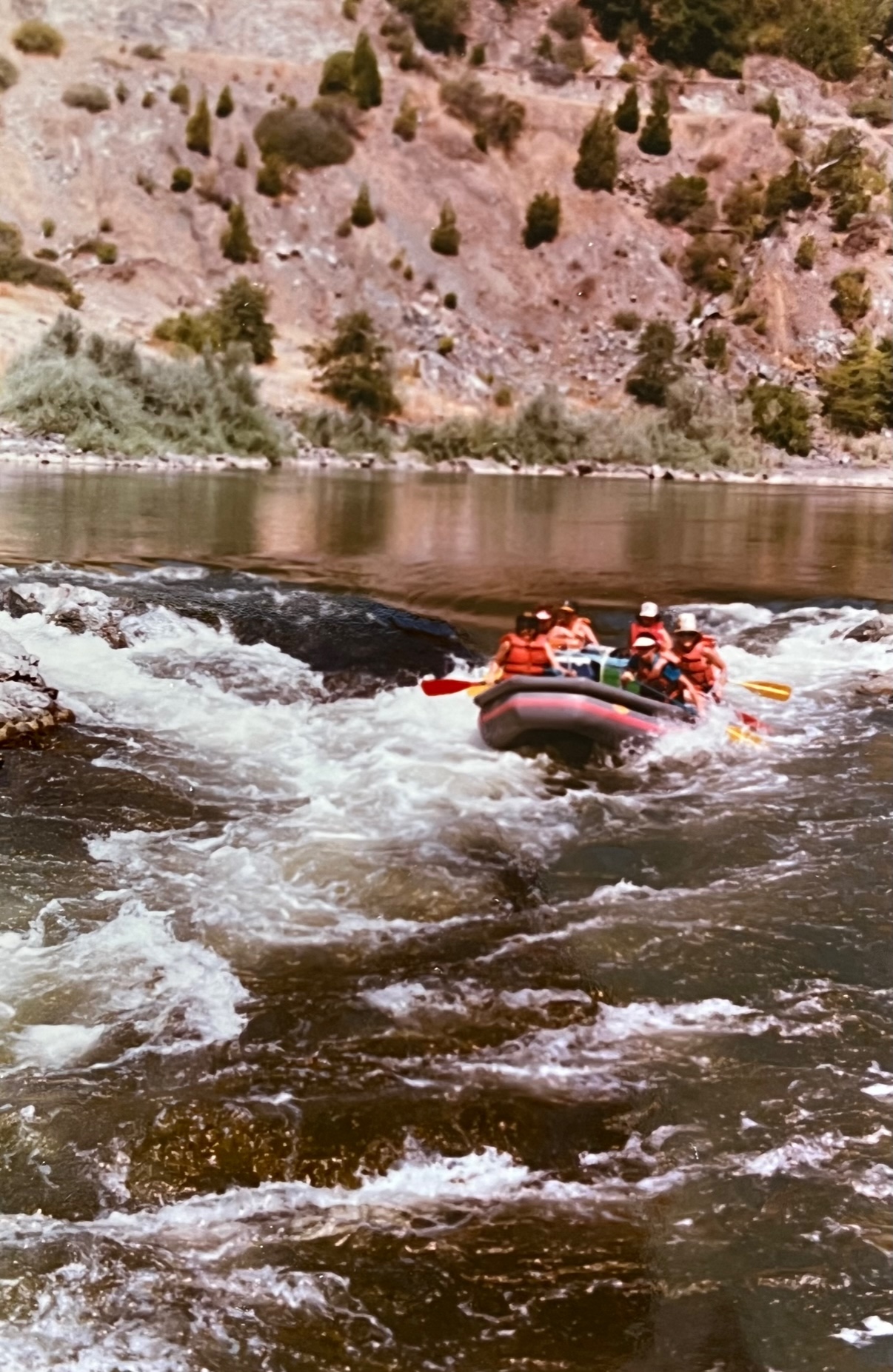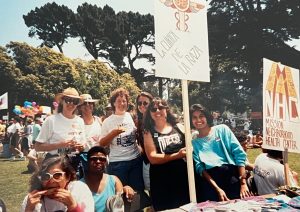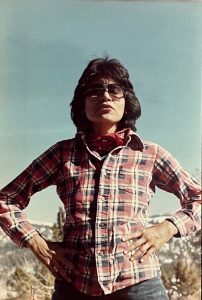
Nancy, our new office manager, was pushing hard on everyone in the clinic to sign up for a rafting trip. She had gone with the same outfit before and assured us it would be wonderful. We would all simply blast off in carpools after work on Friday for the 7- hour trip to the Klamath River, have a great 2 days on the river, and hightail it back to Oakland Sunday night. We were all young then and this almost sounded reasonable.
Our workplace, La Clinica de la Raza, was still small then, nestled in the very urban Fruitvale section of town, the heart of the Spanish-speaking community. The clinic had been founded by Chicano public health activists, inspired in part by the Farmworker movement. Spanish-speaking people had problems getting medical care—it was expensive, not in a language they understood, not in the neighborhood, and it could be unsympathetic or dismissive. Often, they did without. The clinic was scattered over several clumsily converted houses and buildings, with a colorful mural on the dental services building, designed to be a welcoming place. The staff was drawn largely from the local first and second generation Mexican or Central American immigrant community, though mostly the health professionals were not. We all did speak at least passable Spanish, since all services were offered in both English and Spanish, and we were there because we were enthusiastic about the project (certainly not for the pay). It was a wonderful group of co-workers.
In addition to work in the clinic itself, we cultivated sympathetic specialists and we provided important medical, language, and emotional support for those who were hospitalized, sometimes in the face of blatant attempts to exclude clinic patients. I was present at in the obstetrics department meeting at Alta Bates hospital where they discussed ways to limit hospital privileges for our staff to get a better “patient mix”, one that would reimburse more and wouldn’t make the other patients feel they were in a welfare ward (read: nonwhite and poor). Later I would testify about this when the hospital sought to use Hill-Burton money (federal funds that require some community services) for expansion. Advocacy was integral to the work, and it still is.
Overall, I felt lucky to be immersed in the general culture of the Clinica familia. Across the street were a Mexican grocery, burrito stand, flower store and funeral parlor. A panaderia and a few restaurants were nearby, and mobile paletta or elote carts hawked treats. You could buy balloons or pillows from other street vendors. The bank on the corner had been closed but there was a tiny shop where you could wire money to family outside the US, and a post office around the corner that always had a long line of people trying to send packages home. Two blocks down was East 14th Street, later named International Blvd, running the length of Oakland from downtown to San Leandro, with storefronts and signs that told the history of the city in different languages, foods, businesses and empty spaces– sequentially more Asian, Latin, or African American as you moved towards the southeast. Cars and buses crowded the streets; a few blocks away the BART screeched into the Fruitvale Station (yes, the same one that became the title of a movie years later). You wouldn’t know it, but close by, Sausal Creek flowed from the hills to the bay in culverts.
In any case, there was quite a distance between the busy daily life in the Fruitvale with its culverted creek and a rafting trip on a wild river in the mountains. It was outside the experience of most of the staff, but Nancy recruited about ten of us for the adventure, including the lab manager and several of her crew, medical assistants, physicians and midlevels. And so, in August of 1984, we crammed into our vehicles and hit I-5 through the Sacramento Valley heading north, through the Siskiyous, past Mount Shasta and ever further north until we almost reached the Oregon border.
She was right—we all had a great time. The Turtle River rafting company guides were competent and caring and really fun. We had paddle rafts—the guide would steer and the rest of us would have to dig in with our paddles, high side into waves, and in all cases heed the guide’s direction to avoid the dreaded wrap on a rock or capsizing into a hole. There was only one major rapid on the middle Klamath but we all pulled together and we all survived still happy. In the quiet sections, we could paddle inflatable kayaks. The guides made delicious food and we camped under the stars, watching streaks from the Perseid meteor shower fall through the dark sky. Even though the trip was only a short weekend, it felt much longer. We were miles away from Oakland, far from the stress of work and in one of those magic places where things seem to be as they were meant to be.
We piled back into our cars for the drive home, tired but in good spirits. South of Redding we decided to stop for a restroom break and to get something to eat, so I pulled into a T and A truck stop off an exit. Suddenly Catalina was in a mild panic. Were we really going to stop there? I said, sure, why not? Catalina came from a family that had worked in the fields in the Central Valley, and said, “We would never stop at a place like that—we might get beat up.” I was taken aback. It had never occurred to me that could be an issue. But I had not travelled the back roads of the Central Valley as she had, was not brown or a farmworker, and didn’t have to consider the prejudice as she did. It took a bit of convincing to get her out of the car, with assurances that we would protect her, but she did have her first truck stop meal. Soon, we piled back into the car together and headed south. It was late and there was still a long way to go..





Another one of your astonishing, beautiful, heartfelt stories, Khati. Long in evocative details, rich in time and place, you take us on your wild, lovely trip, then rip out our hearts when your colleague is afraid to eat at the truck stop for fear of being beaten up. How good of you all to protect her, while learning what she has lived her whole life. And you let us understand too. We pray that we can move beyond that, but I fear we slipping backward.
You are right Betsy, it seems that there is a real backsliding to where we really do NOT want to go. That is so distressing. Never more important to champion humanity, tolerance, acceptance and respect.
An interesting story well told.
It is quite a shock sometimes to us members of the majority group to see that the experiences of people in less favored demographics are often far different than we imagine. White privilege is often simply that no one gives us any crap for just being there.
Yes, you are so right about White privilege. I actually do try to think about that quite a bit when I am maneuvering about the world. As a side note, I kind of wondered what it would be like when we spent a week in Paris with a very dark-skinned friend from the Caribbean. Well, of course it was Paris, but also all the Uber drivers were from Africa and they all hit it off immediately and they were all smitten with her. We were just the White fares, but she was the star. It was great to see the other side.
This was a very effective way to respond to the prompt. You provided the entire temporal, social, geographical context so that a reader, now fully immersed in time and place and society, could be punched in the gut with this out-of-the-blue difference in perspective. Well done.
Thanks Dale, I’m glad the story made its point. Sometimes I think there is a longer way to go now than there was at the time of the story, almost forty years ago.
As White people, it’s hard to have empathy for what other’s have experienced in terms of racial prejudice. Your work experience helped you gain considerable insight.
Yes, it is always useful to be able to see things from another perspective and I feel fortunate to have had a wide variety of experiences. Of course, prejudice is not just racial–religion, gender, class, country of origin are all favorite targets. In general, whatever helps us see each other as human, be it travel or work or family, seems like a really good idea.
“White privilege” has blinded us.
Thanx Khati for your always wonderfully written and heartfelt story.
Amen.
Khati:
I can relate to your experiences. I spent a short time with migrant workers in Goshen, California where I came to understand another meaning of prejudice–oppression, repression, and hunger. The life was close to a feudal existence. The managers enforced destructive codes. For instance, the hoes were legally required to be long enough so that one could work nearly upright allowing for conversation and observation of the fields and work. But in Goshen, the overseers reduced the handle to under two feet so the laborers could not stand up while weeding, socializing, or viewing the end of the furrow.
None of the Mexiczan workers knew much English if any. They had no choice in their diets. They ate primarily out of canned food. Their sleeping quarters were minimal. Cesar Chavez did not reach them until later.
They enjoyed their lives at night–talking, laughing. My Spanish was not developed enough to engage in conversation. I was primarily an observer.
I liked their company. Especially without their overseers who drove their trucks back to the ranch after a day of work.
That short-handled hoe became an issue that the UFW took up–really a miserable tool! I worked at a UFW clinic in Calexico for a bit and met many people similar to what you described. They would have to get up at an ungodly hour to show up at a work point and hope they were picked for that day–and the work was super hot and physically demanding. And, as you said, really nice people despite all that. Who definitely did not deserve how they were treated.